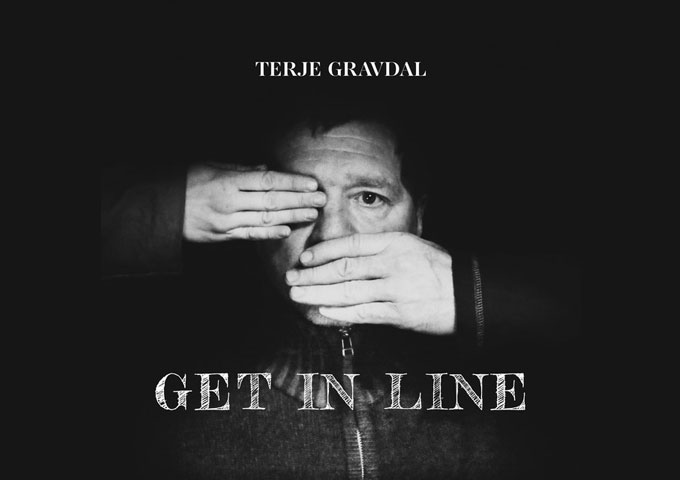
Terje Gravdal’s “Get in Line”: A Stirring Call to Question Authority and Rethink Priorities
From the picturesque landscapes of Odda in Hardanger, Norway, emerges a voice that resonates as deeply as the fjords that cradle his hometown. Terje Gravdal, an accomplished country and folk singer-songwriter, brings his contemplative artistry to the global stage with “Get in Line,” a single that not only captivates with its melodious allure but also challenges listeners to probe the societal and environmental narratives that dominate our era.
Musically, “Get in Line” is a masterclass in understated sophistication. The song’s mid-tempo rhythm is anchored by acoustic guitars, their warm, resonant strumming weaving seamlessly with subtle keys and light percussion. Gravdal’s earthy, mellifluous voice sits prominently at the heart of the mix, delivering the lyrics with a clarity and emotional depth that make each word land with significance. The track’s melody is infectious, its chorus a hypnotic refrain that lingers in the listener’s mind long after the music fades.
The production, while polished, retains an organic rawness reminiscent of the outlaw country tradition, marrying authenticity with finesse. The interplay of instrumentation and vocals creates a sonic environment that is both intimate and expansive, enveloping the listener in its carefully crafted ambiance.
What sets “Get in Line” apart is its ability to evoke emotion without overpowering its central message. The subtle crescendos and delicate harmonics build a narrative arc within the music itself, mirroring the song’s thematic progression. This artistry ensures that the song remains as compelling on a musical level as it is lyrically profound.
At its core, “Get in Line” is a provocative commentary on modern socio-political and economic constructs. Gravdal’s lyrics delve into the dichotomy between promises of salvation and the undercurrents of exploitation. Through repeated references to the “New Order” and “Great Reset,” he critiques the mechanisms by which crises—be they environmental, health-related, or economic—are leveraged to consolidate power and wealth.
The opening lines, “New Order. Great Reset / It’s crisis, don’t forget,” immediately set the tone, presenting a world where fear is weaponized. This motif recurs throughout the song, each iteration underscoring a different facet of systemic control: “virus salvation,” “green salvation,” “income salvation,” and “conflict salvation.” These phrases, with their rhythmic repetition, echo like a mantra, challenging listeners to question the authenticity of solutions offered by those in power.
Gravdal’s lyrics also explore the human cost of these grand narratives. Lines like “You lose. They win / Cash out. Trash in” succinctly encapsulate the imbalance of gains and losses, where the burdens of compliance and sacrifice often fall on the many while benefits accrue to the few. This stark depiction of societal inequities serves as a sobering reminder of the systemic disparities that persist in the name of progress. The call-and-response nature of “Please listen. Don’t shout / Breathe in. Breathe out” juxtaposes conformity with a yearning for individual awareness, urging listeners to break free from passive acceptance.
The closing verses shift the tone towards empowerment. The lines, “Stop the lies. Open mouth / Open your ears. Open your eyes,” are a rallying cry for awakening and resistance. Gravdal’s transition from “Get in line” to “They lose. We win / War out. Peace in” symbolizes hope for collective action and the possibility of reclaiming agency. This progression underscores the transformative power of awareness and unity, suggesting that even entrenched systems of control can be dismantled through shared resolve.
“Get in Line” does more than entertain; it provokes reflection on pressing global issues. Gravdal’s exploration of climate discourse—questioning humanity’s role in both creating and solving a crisis—addresses the tensions between genuine environmental stewardship and the commodification of sustainability. His critique extends to other industries, from pharmaceuticals to defense, exposing how financial incentives can skew priorities and policy. The song’s incisive observations also touch on the influence of top politicians, painting them as unwitting (or complicit) agents in the perpetuation of these cycles.
By framing these issues within the accessible medium of music, Gravdal bridges the gap between complex systemic critiques and personal introspection. His storytelling invites listeners to engage with these themes not as distant observers but as active participants in shaping their outcomes. This ability to inspire both thought and action elevates “Get in Line” beyond mere commentary, positioning it as a catalyst for meaningful discourse.
Terje Gravdal’s “Get in Line” is a testament to the power of music as a vehicle for change. It challenges listeners to look beyond surface narratives and question the structures that shape our world. With its harmonious blend of evocative lyrics, captivating melody, and Gravdal’s resonant vocals, the single stands as a poignant reminder of the potential for art to inspire awareness and action. For those seeking music that not only soothes the soul but also stirs the mind, “Get in Line” is a must-listen.
In an era where art is often commodified, Gravdal’s work stands as a beacon of authenticity. His ability to marry the personal with the political, the melodic with the meaningful, ensures that “Get in Line” resonates across diverse audiences. It is a song that speaks to the challenges of our times while offering hope and a call to action—a reminder that even amidst adversity, change remains possible when individuals come together with purpose and conviction.
OFFICIAL LINKS: FACEBOOK – SPOTIFY – INSTAGRAM – YOUTUBE – TIKTOK


